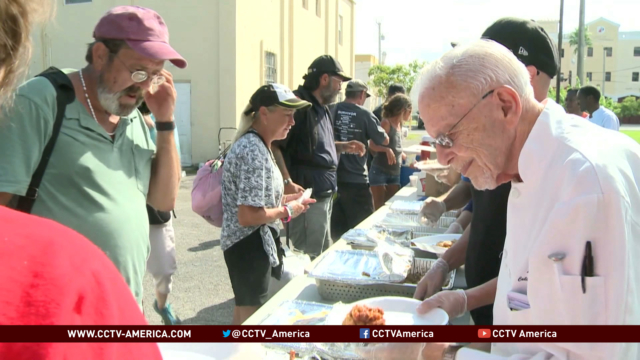Many U.S. cities have blocked the practice of sharing food with homeless and hungry people. Critics point to sanitary concerns and the misuse of public property. But one man in Florida is pushing against the bans.

Arnold Abbott has been cooking for the homeless for more than two decades. The 90-year-old World War II veteran is the director of Love Thy Neighbor, an interfaith volunteer organization that works to help the homeless in Florida’s Broward County with food, shelter, clothing, and education.
Despite receiving three citations for the criminal violation of feeding the homeless in public, Abbott vowed to continue his work.
“My purpose is to perpetuate what I’ve done for 23 years, and that is every Wednesday at 5:30, I feed on the very beautiful beach in Fort Lauderdale,” Abbott said. “I will be there next Wednesday at 5:30 to feed as many homeless as show up.”
Chef Arnold, as local residents call him, became the poster child of a nationwide debate.
“I have a new hobby,” Abbott joked. “Instead of collecting stamps, now I collect citations from the city.”
According to the National Coalition for the Homeless, 22 cities have approved legislation to limit food sharing practices since Jan. 2013. The ordinance in Fort Lauderdale does not only limit outdoor feeding sites, but also requires the permission of property owners to do so. It also requires that groups provide portable toilets.
Fort Lauderdale Mayor Jack Seiler defended the ordinance, but said that he was not forbidding the people’s charity work. “We think the feeding ideally should be indoors,” Seiler said.
Seiler also offered an alternate indoor feeding site to residents and Abbott. “When [Abbott] didn’t take us up on the offer yesterday to use that aquatic center, you begin to wonder if the issue is about feeding the homeless or if there is some other agenda here,” the mayor said.
Those who receive assistance from Abbott’s organization agreed that there might be another agenda coming from the local government.
“They don’t want us to hang out in the area, because of the businesses,” said Johnny Pacheco, who was homeless. “I think they don’t want us to be there no more.”
“The city of Fort Lauderdale does not want to do anything, they just want to move us from one area, out of their area and let someone else deal with the problem, that is what they want to do,” Michael Nagy, a food assistance recipient, said.
CCTV America’s Nitza Soledad Perez reported this story from Fort Lauderdale, Florida.
Neli Vazquez-Rowland discusses poverty, homelessness in the US
CCTV America interviewed Neli Vazquez-Rowland for insight into the best ways to try to reverse homelessness. She is the Co-Founder and President of A Safe Haven Foundation. It’s a group that helps rebuild lives from homelessness and poverty.

 CGTN America
CGTN America
